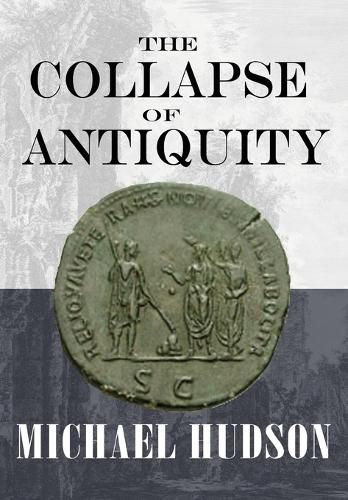Readings Newsletter
Become a Readings Member to make your shopping experience even easier.
Sign in or sign up for free!
You’re not far away from qualifying for FREE standard shipping within Australia
You’ve qualified for FREE standard shipping within Australia
The cart is loading…






This title is printed to order. This book may have been self-published. If so, we cannot guarantee the quality of the content. In the main most books will have gone through the editing process however some may not. We therefore suggest that you be aware of this before ordering this book. If in doubt check either the author or publisher’s details as we are unable to accept any returns unless they are faulty. Please contact us if you have any questions.
The Collapse of Antiquity: Greece and Rome as Civilization's Oligarchic Turning Point
The Collapse of Antiquity, the sequel to Michael's "...and forgive them their debts, " is the second and latest book in his trilogy on the history of debt. It describes how the dynamics of interest-bearing debt led to the rise of rentier oligarchies in classical Greece and Rome, causing economic polarization, widespread austerity, revolts, wars and ultimately the collapse of Rome into serfdom and feudalism. That collapse bequeathed to subsequent Western civilization a pro-creditor legal philosophy that has led to today's creditor oligarchies.
In telling this story, The Collapse of Antiquity reveals the eerie parallels between the collapsing Roman world and today's debt-burdened Western economies.
Endorsements
Scope
The Collapse of Antiquity is vast in its sweep, covering:
the transmission of interest-bearing debt from the Ancient Near East to the Mediterranean world, but without the "safety valve" of periodic royal Clean Slate debt cancellations to restore economic balance and prevent the emergence of creditor oligarchies; the rise of creditor and landholding oligarchies in classical Greece and Rome; classical antiquity's debt crises and revolts, and the suppression, assassination and ultimately failure of reformers; the role played by greed, money-lust (wealth-addiction) and hubris, as analysed by Socrates, Plato, Aristotle and other ancient writers; Rome's "End Time" collapse into serfdom and pro-creditor oligarchic legacy that continues to shape the West; the transformation of Christianity as it became Rome's state religion, supporting the oligarchy, dropping the revolutionary early Christian calls for debt cancellation and changing the meaning of the Lord's Prayer and "sin," from a focus on the economic sphere to the personal sphere of individual egotism; how pro-creditor ideology distorts recent economic interpretations of antiquity, showing increasing sympathy with Rome's oligarchic policies.
$9.00 standard shipping within Australia
FREE standard shipping within Australia for orders over $100.00
Express & International shipping calculated at checkout
This title is printed to order. This book may have been self-published. If so, we cannot guarantee the quality of the content. In the main most books will have gone through the editing process however some may not. We therefore suggest that you be aware of this before ordering this book. If in doubt check either the author or publisher’s details as we are unable to accept any returns unless they are faulty. Please contact us if you have any questions.
The Collapse of Antiquity: Greece and Rome as Civilization's Oligarchic Turning Point
The Collapse of Antiquity, the sequel to Michael's "...and forgive them their debts, " is the second and latest book in his trilogy on the history of debt. It describes how the dynamics of interest-bearing debt led to the rise of rentier oligarchies in classical Greece and Rome, causing economic polarization, widespread austerity, revolts, wars and ultimately the collapse of Rome into serfdom and feudalism. That collapse bequeathed to subsequent Western civilization a pro-creditor legal philosophy that has led to today's creditor oligarchies.
In telling this story, The Collapse of Antiquity reveals the eerie parallels between the collapsing Roman world and today's debt-burdened Western economies.
Endorsements
Scope
The Collapse of Antiquity is vast in its sweep, covering:
the transmission of interest-bearing debt from the Ancient Near East to the Mediterranean world, but without the "safety valve" of periodic royal Clean Slate debt cancellations to restore economic balance and prevent the emergence of creditor oligarchies; the rise of creditor and landholding oligarchies in classical Greece and Rome; classical antiquity's debt crises and revolts, and the suppression, assassination and ultimately failure of reformers; the role played by greed, money-lust (wealth-addiction) and hubris, as analysed by Socrates, Plato, Aristotle and other ancient writers; Rome's "End Time" collapse into serfdom and pro-creditor oligarchic legacy that continues to shape the West; the transformation of Christianity as it became Rome's state religion, supporting the oligarchy, dropping the revolutionary early Christian calls for debt cancellation and changing the meaning of the Lord's Prayer and "sin," from a focus on the economic sphere to the personal sphere of individual egotism; how pro-creditor ideology distorts recent economic interpretations of antiquity, showing increasing sympathy with Rome's oligarchic policies.